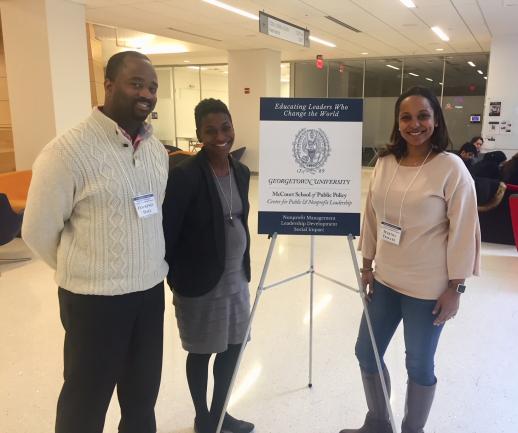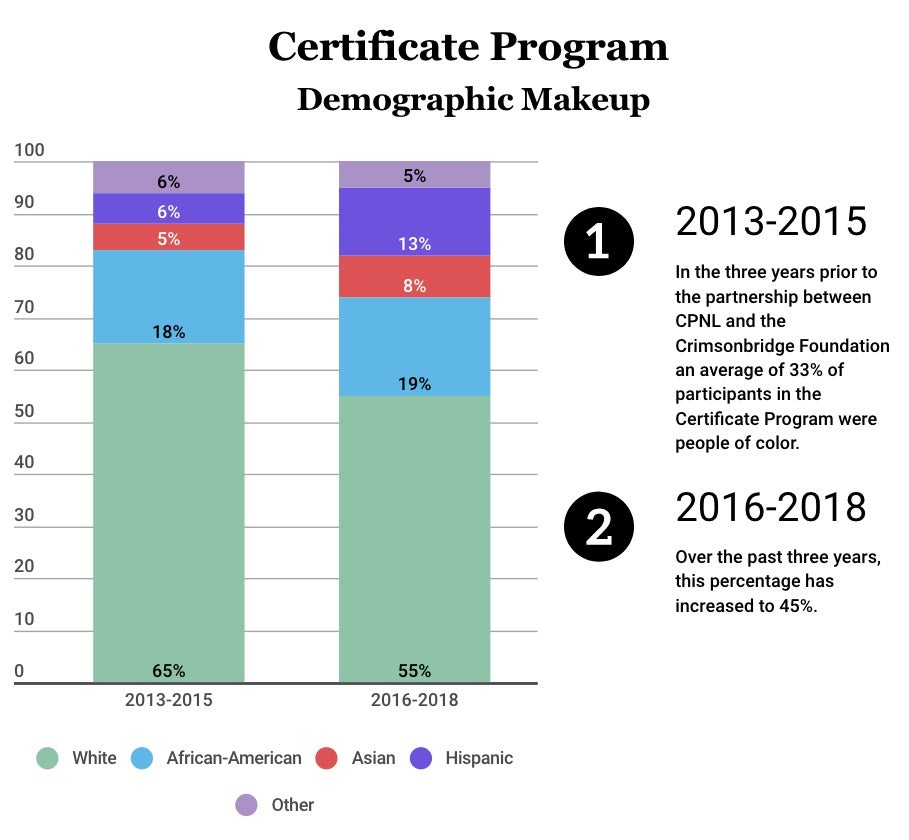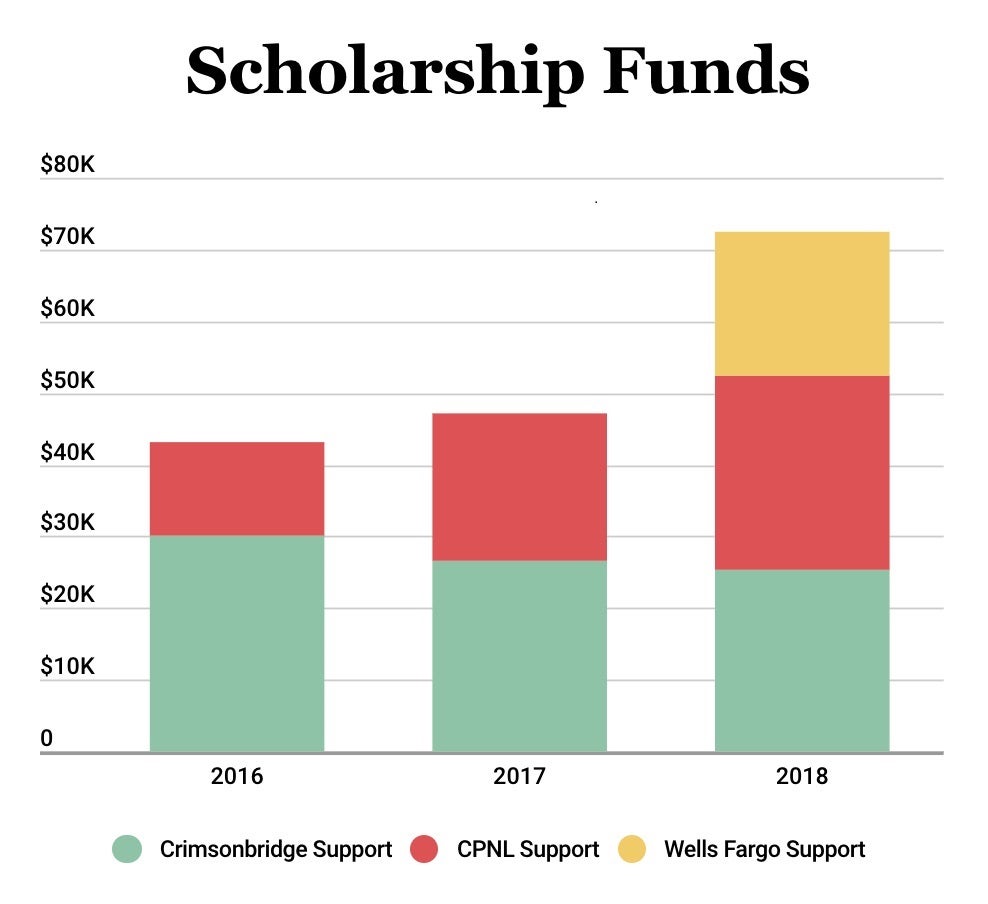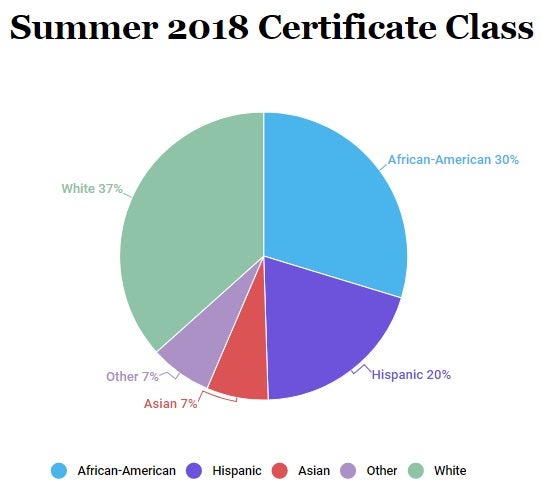Three-Year Partnership with Crimsonbridge Foundation Leads to More Diversity and New Scholarships in Certificate Program

Since 2016, the Center for Public & Nonprofit Leadership (CPNL) at Georgetown’s McCourt School of Public Policy and the Crimsonbridge Foundation have partnered to provide scholarships aimed at developing the leadership of Greater Washington Region nonprofits. The scholarships make it possible for leaders from locally-based and locally-serving organizations to attend the Nonprofit Management Executive Certificate Program.
Over the past three years, we have seen the impact of the scholarship program grow. In this article, we document our lessons learned from the partnership with the Crimsonbridge Foundation, which was founded in 2015 by Gabriela Smith. We hope they can help inform how foundations support nonprofit capacity building as well as how best to develop equitable outreach practices for scholarship opportunities.
INVESTMENT OF MONEY AND TIME
“The Crimsonbridge Leadership Fund Scholarships came at the perfect time for CPNL,” notes Center Assistant Director, Luisa Boyarski. “We had just discussed with our faculty the challenges we were facing in recruiting local nonprofit leaders to attend the Certificate Program. The partnership with Crimsonbridge has made it possible to intentionally focus on building a network needed to attract a strong pool of local applicants.”
The Center committed staff time to build an outreach strategy for publicizing the new Crimsonbridge Leadership Fund scholarships. It also led the application and selection process, which became more time consuming, as the number of scholarship applications grew. Through direct and personalized outreach to individuals and specific organizations, the scholarship opportunity brought the program to the attention of individuals who may not have considered it – either because of financial constraints or the perception that the program was not meant for them. We found that personal targeted emails and meetings were most effective in recruiting applicants, rather than general email blasts. Often emails that came from the Foundation were more likely to be acted upon than emails coming from the University, due to existing relationships between the foundation and nonprofits. Still, many of the scholarship applicants and recipients were not current grantees of the Crimsonbridge Foundation.
CHANGE IN PARTICIPANT DEMOGRAPHICS
The investment of the Crimsonbridge Foundation and the Center has significantly impacted the demographics of the participants in the Certificate Program, creating a much more diverse pool than in previous years. In the three years prior to the partnership, an average of 33% of participants in the Certificate Program were people of color. Over the past three years when Crimsonbridge scholarships have been offered, this percentage has increased to 45% (See Demographic Makeup Chart). Increases can be seen in African American, Hispanic and Asian participants – a result that the partners attribute to the fact that the scholarships are designated for “people from diverse backgrounds” not “people of color.” The Crimsonbridge Foundation found that some minority populations do not necessary feel that the term “people of color” applies to them, and thus wanted to ensure that they were being as inclusive as possible.

Since the Crimsonbridge Leadership Fund supports leaders of locally-based and locally-serving organizations, the number of local nonprofits represented in the Certificate Program has also increased. From 2013 to 2016, the number of local nonprofit leaders receiving scholarships averaged three leaders per class. In the past three years, that number has increased to an average of nine local nonprofit leaders receiving scholarships per class.
The increased availability of targeted scholarships that Crimsonbridge provided to local leaders freed up CPNL’s program funding for scholarships for other diverse applicants not necessarily working in the DC community. This resulted in an increase in diversity across the board, not just within the Washington, DC region. Over the past three years, 82 leaders have received scholarships to the Certificate Program, an average of 16 per class.
GROWING NETWORKS AND NEW SCHOLARSHIPS
As the number of alumni who have received scholarships increased, we were able to tap into their networks, thus widening and deepening our future outreach. This network expansion has also occurred within the funding community. Danielle M. Reyes, Executive Director at Crimsonbridge, has been a strong advocate of the importance of building the capacity of local nonprofit leaders and organizations. As she shared her experience with other foundations and organizations, two new sources of scholarships for the Certificate Program came to fruition. In the most recent Summer 2018 program, Wells Fargo awarded $20,000 in scholarships to four grantees working on community and small business development. Next spring, the World Bank will provide $10,000 scholarships to local nonprofit leaders.

Reyes has also been intentional in helping to continue building the networks of alumni who received scholarships. She notes that the foundation strives to get to know each participant on an individual level—sending them an email, meeting them over lunch or coffee, or connecting with them directly on social media.
“We keep an updated file on each participant,” she adds, “with the hope of continuing to engage with them and, ultimately, keep them in the sector.”
In fact, many participants keep in touch with Crimsonbridge and enlist them in facilitating introductions with other potential community partners. Whenever the foundation is attending a networking event, Danielle invites a few scholarship recipients to attend, helping open doors for them in circles where they may not already have contacts.
Moving forward, our goal is to continue tapping into new networks but also sustain our relationships with current ones. Diverse networks make it possible for us to continue recruiting leaders with the greatest potential to lead the nonprofit sector into the future.
BUILDING COMMUNITY LEADERS
In 2018, the Crimsonbridge Foundation provided scholarships to nine Greater Washington nonprofit leaders to attend the Certificate program.

After participating in the program, scholarship recipient Claire Roach, Chief Operating Officer of YWCA National Capital Area, is more confident in her skills, knowledge and abilities as a nonprofit leader. The opportunity “reinvigorated [her] passion for working in the nonprofit sector,” and she will be using her post-program Capstone Project to reinforce the importance of a defined talent management strategy for her senior leadership team. Roach highly praises the scholarship program, stating that Crimsonbridge is “helping to build the knowledge and competency of nonprofit leaders. By investing in the development of nonprofit leaders, the Crimsonbridge Foundation will significantly improve the impact and sustainability of nonprofit organizations.”
Scholarship recipients also felt better equipped as professionals in their leadership roles. Javier Bustamante, Executive Director of Cultural Diversity and Outreach at the Archdiocese of Washington, is excited to apply the new concepts and strategies he learned. The Certificate Program “allowed me to see leadership and impact from a different perspective,” Bustamante notes. He feels more prepared to handle strategic planning processes, set and achieve organizational goals, and capitalize on the talents of his existing staff.
Reyes concludes that the success and impact she’s seen come from the scholarships are rarely the result of funding alone. “Our hope is that by deploying the foundation’s staff, network, and funding resources, we can support individual leaders and a more diverse and representative landscape of nonprofit leadership in the D.C. region.”
